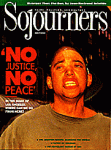Philosopher George Santayana's observation that those who fail to learn from history are condemned to repeat it is, one would think, so logically obvious as not to merit elucidation. Not so in this country, where amnesia is a political virtue. From its inception, the United States has been, according to the eminent diplomatic historian Gabriel Kolko, "a nation blind to itself?its past...and its future."
Recent developments in Los Angeles tend to confirm these views. LA's black intifada was inevitable. It was simply a matter of time and circumstance. As things stand currently, this intifada may have been simply a dress rehearsal. Amidst this crisis, however--which is only the most recent chapter in an ongoing drama--there are valuable opportunities.
The political events following the acquittal of four white Los Angeles police officers in the Rodney King affair incontrovertibly demonstrate at least two factual realities: (1) the utterly delusional state of national elite policy intelligentsia, journalists, and politicians on matters of race; and (2) the primacy of an explicitly anti-black racism--as opposed to merely a problem of "race"as the predominant dynamic driving the electoral behavior of non-black interest groups in national politics.
In my judgment, the polarization of the United States into a de facto apartheid state in our domestic Sowetos provides a singular opportunity for the church to present a unique political perspective, grounded in the theological affirmations of the confessional community. The first opportunity for the churches is intellectual. The importance of an accessible body of fresh theory and analysis of the transformation and patterns of racial stratification cannot be overstated. It has been the absence of just such hard analysis that has crippled the churches' capacity to anticipate trends and effectively respond to them.
In the wake of the LA uprising, the moral rhetoric of "racial reconciliation" of the peace and justice wing of the church is no longer a rational substitute for the kind of sustained structural analysis we need. Instead, new black and white church leadership should work together to construct mutually supportive and realistic programs for action, filling in the gap where liberal and conservative policy regimes have failed.
Based on our work with gang members and young drug dealers in inner-city Boston, we at Azusa Christian Community have developed a "Ten-Point Proposal for Citywide Mobilization to Combat the Material and Spiritual Sources of Black-on-Black Violence." This proposal has evolved out of our view that sooner or later the intifadas would begin among those classes of young people that the church and the larger society had rejected.
Anticipating such a possibility in Boston, we began a little over a year ago to develop an aggressive strategy to hit the streets, courts, and jails. We are now calling upon churches, church agencies, and the academic theological community throughout the city to consider, discuss, debate, and implement any one or more of the 10 ideas, which include: to establish "Adopt a Gang" programs that organize and evangelize youth in gangs; to commission missionaries to serve as court advocates for black and Latino juveniles; to train street-corner evangelists to work with youth involved in drug trafficking; to do informal pastoral work with troubled and violent youth and their families; and to establish rape crisis centers and services for battered women, that also provide counseling for abusive men.
The crises generated by the capitalist urbanization process present an opportunity for the emergence of new moral and intellectual leadership. If the community of faith--black or white--rises to the occasion, we may be able to retrieve a generation cut adrift. If not, we will have brought down the judgment of God on ourselves and inadvertently fueled the fire for the next time.
Eugene Rivers was director of the Seymour Institute for Advanced Christian Studies and pastor of the Azusa Christian Community in inner-city Boston when this article appeared.

Got something to say about what you're reading? We value your feedback!
